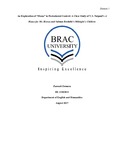| dc.contributor.advisor | Mahbub, Dr. Rifat | |
| dc.contributor.author | Zumara, Zannati | |
| dc.date.accessioned | 2018-01-14T08:30:03Z | |
| dc.date.available | 2018-01-14T08:30:03Z | |
| dc.date.copyright | 2017 | |
| dc.date.issued | 2017-08 | |
| dc.identifier.other | ID 13303013 | |
| dc.identifier.uri | http://hdl.handle.net/10361/9045 | |
| dc.description | This thesis is submitted in partial fulfillment of the requirements for the degree of Bachelor of Arts in English, 2017. | en_US |
| dc.description | Cataloged from PDF version of thesis. | |
| dc.description | Includes bibliographical references (pages 58-62). | |
| dc.description.abstract | Home has always been a persisting topic in literature from the Early Victorian time to the present postmodern time. In literature ‘home’ has always occupied a central position be it as setting, symbol or metaphor, or to denote politics surrounding home or to establish community and gender relationships. The word ‘home’ remains same but the connotations and representation of home changes in these literatures. In addition, the present situation of ‘homelessness” or “unhomely” feeling among the refugees, immigrants, ethnic and minority groups, North Korean defectors etc. have made it more important than ever to look at the idea of home and its changing process from a fresh perspective. Perhaps postcolonial literature is still the most powerful space to ask questions about the idea of home. A great change in the idea of ‘home’ is witnessed in the postcolonial context. Hence, this thesis is an enquiry of ‘home’ in two well-established postcolonial novels titled A House for Mr. Biswas by V.S. Naipaul and Midnight’s Children by Salman Rushdie to interpret the idea of ‘home’. Hence, my major concern will be to scrutinize the reasons and the triggering factors behind the process of changing ‘home’ and how it creates a desire for owning a house” in one novels and becomes an ‘unhomely’ space in another novels in postcolonial context. Also, I will slightly reflect upon the female experience of this changed ‘home’ in both the novels. Apart from these two novels as primary resources, I will use scholarly journals, articles and other relevance books as secondary resources | en_US |
| dc.description.statementofresponsibility | Zannati Zumara | |
| dc.format.extent | 62 pages | |
| dc.language.iso | en | en_US |
| dc.publisher | BARC University | en_US |
| dc.rights | BRAC University thesis are protected by copyright. They may be viewed from this source for any purpose, but reproduction or distribution in any format is prohibited without written permission. | |
| dc.subject | Home | en_US |
| dc.subject | Postcolonial context | en_US |
| dc.subject | | en_US |
| dc.subject | Midnight’s children | en_US |
| dc.title | An exploration of “home” in postcolonial context: a close study of V.S. Naipaul’s a house for Mr. Biswas and Salman Rushdie’s Midnight’s children | en_US |
| dc.type | Thesis | en_US |
| dc.contributor.department | Department of English and Humanities, BRAC University | |
| dc.description.degree | B.A. in English | |

